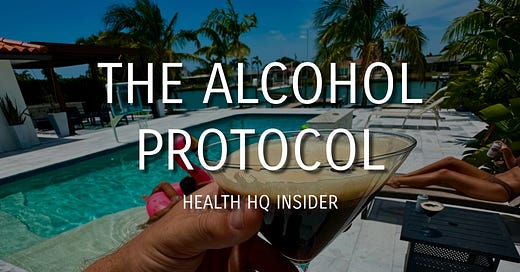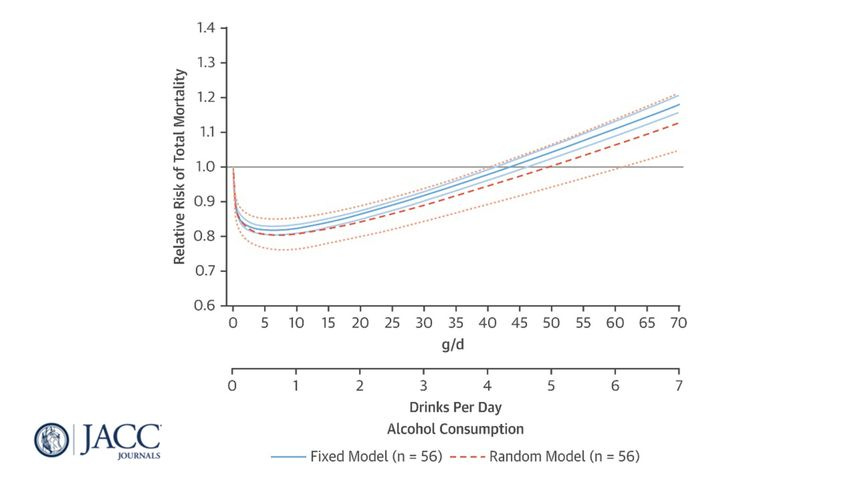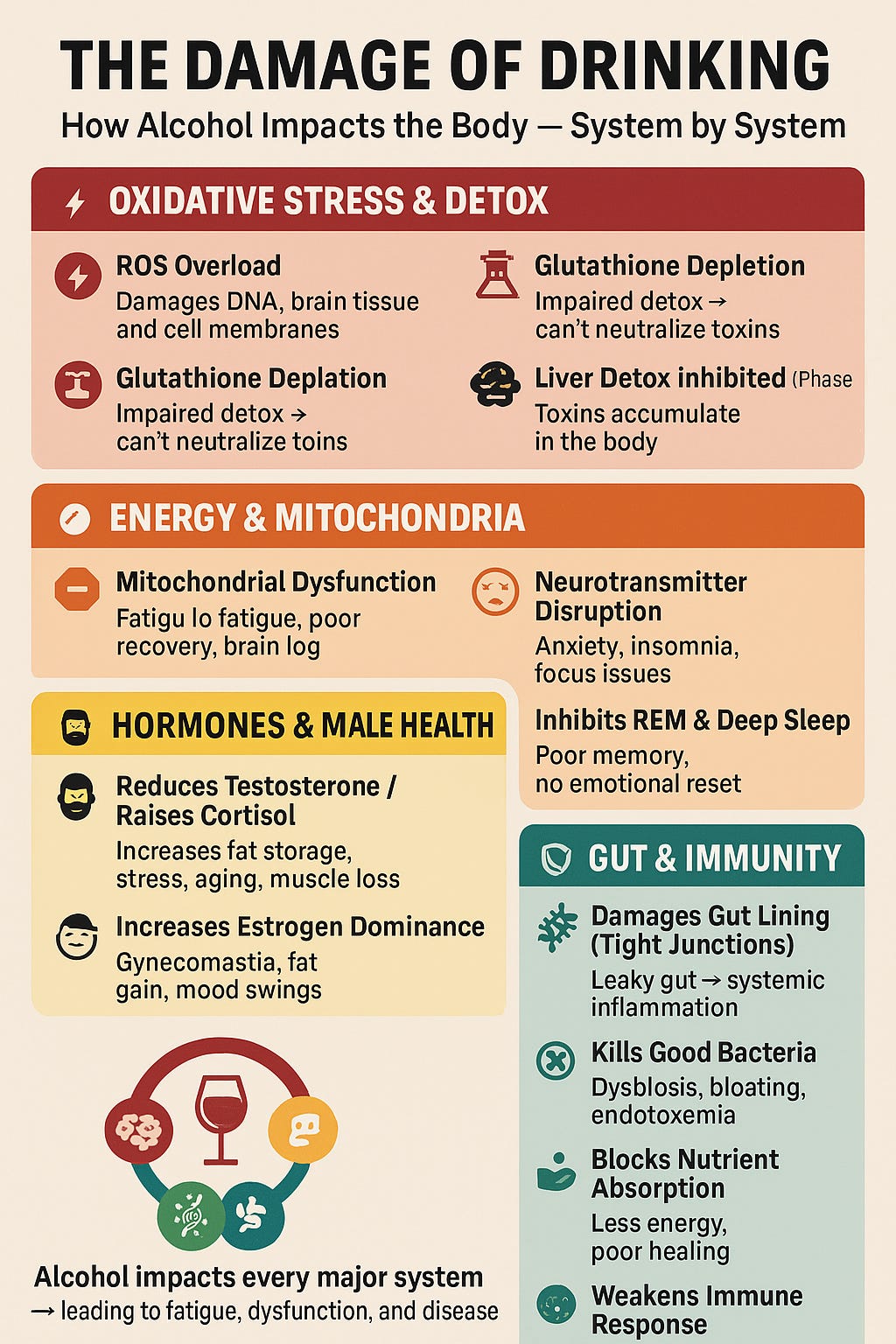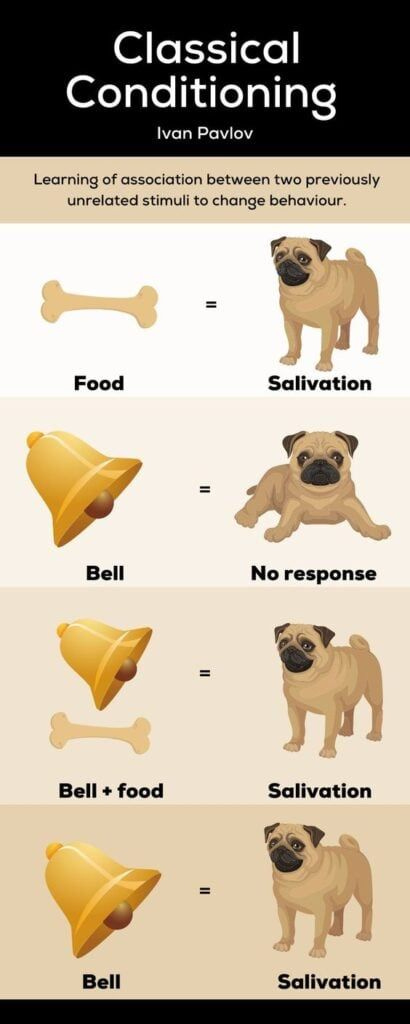After YEARS of split-testing, I’ve come to the undeniable conclusion that I perform better when I drink alcohol.
Not wasted. But 6-10 drinks spread across a week? I'm sharper, more creative, better looking, and significantly more productive than when I'm completely sober.
This isn’t cope, quite the opposite. On paper alcohol is awful for you and I’ve cut it out for months at a time.
Every time I go straight and narrow, the results are just meh. I somehow get in worse shape, my skin gets worse, my gut health gets worse, I’m less creative, and my overall output dwindles.
I'm not justifying alcohol consumption. That shit is literal poison. But there's a reason nearly every civilization discovered fermentation independently. There's a reason every country has a drinking culture (and the ones that don't do even crazier stuff).
It's a disinhibitor that opens the floodgates to otherwise repressed actions and behaviors. The question isn't whether alcohol is "good" or "bad", it's whether you can harness its power without becoming a self-destructive loser.
For some people, alcohol means:
acting a fool
eating garbage food
destroying their gut & liver
drinking more alcohol
But use this disinhibitor correctly and you can reap its benefits:
new ideas
creative exploration
social bonding
myopic enjoyment
Yes, alcohol is a poison. Yes, most people should drink less. But IF you’re going to drink, do it the right way, the Informed Degenerate Method way.
We KNOW that demonizing substances doesn’t work (See: D.A.R.E. Program + war on drugs). Black and white thinking only gets you so far. Real ones learn how to entertain nuance.
So this protocol will show you how to have your cake and eat it too:
Maximize the pro-social benefits of alcohol
Protect your gut, brain, and liver
Optimize for health, physique, and physical performance (while enjoying a cheeky beverage
All the pros, minimized cons. This is how we do it.
Lets get it.
Why do Humans Drink?
They say Alcohol is God’s gift for making us sentient. And by they I mean me. Humans have been hounding booze since they found out fermented fruit made them feel frisky. Every civilization discovered fermentation independently. That's not a coincidence.
The question isn't "Is alcohol bad for you?" (it is). The question is "Are the second and third-order effects worth the first-order damage?"
Social Lubrication = Network Effects
Alcohol removes social friction. In a world where most people are socially retarded, alcohol temporarily fixes this. Easier conversations with strangers. Lowered social barriers for business/romantic connections. Shared experiences that bond people together.
Alcohol makes way for compounding network effects. Random conversations that can lead to your next business partner, wife, or life-changing opportunity. How do you quantify that against liver damage? You can make up for a hurt liver, you can’t make up for a life not lived
Disinhibition = Creative Breakthrough
Your prefrontal cortex is both your best friend and worst enemy. It keeps you safe, but it also keeps you small. Alcohol temporarily suppresses the part of your brain that says:
"That idea is stupid"
"People will judge you"
“You’re ugly”
"Everybody hates you”
Some of history's greatest creative works happened under the influence. Not because alcohol makes you creative, but because it removes the mental governor that prevents creative expression.
I would gladly shave off a couple IQ points for a CHANCE at one of these breakthroughs. But thats just me.
Stress Relief = Longevity?
Chronic stress kills faster than moderate drinking. A type-A, never-drink, optimize-everything personality is more toxic than having 2-3 drinks a week. The guy who has a beer after work and actually relaxes might outlive the biohacker who tracks every biomarker but never truly unwinds.
The Hormesis Effect
What doesn't kill you makes you stronger. Alcohol is a mild toxin that triggers adaptive responses:
Upregulates antioxidant systems (when consumed moderately)
Improves stress resilience through controlled damage/repair cycles
May trigger beneficial autophagy and cellular cleanup mechanisms
Forces your liver to become more efficient at detoxification
This is why moderate drinkers often outlive both heavy drinkers AND complete abstainers in epidemiological studies.
The J-Curve Effect
Health optimization can become its own addiction. The guy who won't have a single drink but:
Spends 3 hours daily researching supplements
Obsesses over every biomarker
Can't enjoy social situations without analyzing the health impact
Judges others for their choices
Who's actually healthier? The "unhealthy" person enjoying life or the "healthy" person destroying their mental health through optimization anxiety?
Moderate drinking consistently shows better health outcomes than abstinence:
Lower all-cause mortality
Reduced cardiovascular disease
Better cognitive function in aging
Lower rates of diabetes
Improved social connections (which predict longevity better than most biomarkers)
The health authorities hate this because it complicates their simple "alcohol bad" message. But the data is clear: 1-2 drinks per day often beats zero drinks.
Its probably not the alcohol itself, but the lifestyle factors that correlate with moderate drinking: Better stress management, Stronger social connections, More balanced approach to life, Less neurotic about health
What are you Optimizing for?
Health optimization assumes infinite time horizon. But what if you don't have infinite time?
Scenario A: Live to 85, never drink, optimize everything, miss social experiences Scenario B: Live to 82, drink moderately, build stronger relationships, take more risks
Which life was better lived? The extra 3 years of optimization or the decades of enhanced social connection?
The people who live the best lives aren't necessarily the healthiest on paper. They're the ones who make conscious trade-offs aligned with their values.
If alcohol helps you:
Build stronger relationships
Take creative risks
Manage stress effectively
Enjoy life more fully
Then the "damage" might be worth it. Especially if you're mitigating that damage with proper protocols.
The Healthy Approach to Alcohol Consumption
Alcohol Abuse ≠ Informed Degeneracy
Supplement stacking won’t solve an alcohol issue because an alcohol issue is a substance abuse issue. And substance abuse issues are a problem of state.
Its a maladapted solution to a problem that hasn’t yet been confronted. So if you’re using alcohol as a numbing agent, external regulation, or a break from a meaningless existence, do not expect this stack to do the work for you. If you have an issue, embrace it as a challenge to overcome. Don’t be ashamed. All great minds have their struggles.
If you don’t like how much you’re drinking, consider my chemical-addiction stack. Addictions of any type operate on the same pathways and mechanisms in the brain, and this stack (namely NAC, Agmatine Sulfate, BPC-157, and Niacin) can help tackle the biological component, giving you the breathing room to tackle the psychological.
Rebuilding your Relationship with Alcohol
Ponder on your relationship with alcohol. How does it change you? Dig deep into all the risk factors involved. Play devils advocate and try to convince yourself not to drink alcohol You will be detached enough to make a rational decision to reincorporate it.
Every drink needs to be worth its weight. Overconsumption is frivolous & self-destructive.
Who you are is predicated on the inputs you give it. Changing your inputs changes you (for better and worse). Go through a period of full abstinence. You’ll gain a better perspective on how alcohol changes you on a macro and micro scale
Flipping the Cue
You crave alcohol because triggers remind you of what you like about booze: the buzz, the disinhibition, the liquid confidence. Learn to flip the cue. Fixate on what you dislike: the hangover, the bad decisions, the sloppiness, the belly fat.
Meditate on this. Be objective. Clearly identify the pros and cons so you can make an informed, rational decision on whether or not that drink is worth it.
While you’re gathering the subjective reasons why alcohol is bad, let me tell you the objective reasons why alcohol is bad:
Why you SHOULDN’T Drink Alcohol
Alcohol (ethanol) isn’t even the problem. ACETALDEHYDE is. This metabolic byproduct is the root of all your problems (30x more toxic than ethanol). It doesn’t make you feel drunk, it just makes you feel like trash:
Anxiety
Flushing
Nausea
Neuroinflammation
All while damaging your DNA, wrecking your liver, gunking up your metabolism, and causing an inflammatory cascade.
The Damage of Drinking:
Cellular & DNA Damage
Skyrockets reactive oxygen species (ROS) → Damages DNA, cell membranes, and brain tissue
Depletes antioxidant enzymes (like glutathione) → Unable to neutralize toxins or recover from stress
Disrupts mitochondrial function → Fatigue, brain fog, poor recovery
Brain & Nervous System
Destabilizes neurotransmitters → Anxiety, irritability, insomnia, and focus loss
Spikes, then crashes dopamine → Apathy, low motivation, addictive patterns
Inhibits REM and deep sleep → Prevents emotional processing, cellular repair, and memory consolidation
Hormonal Chaos
Elevates cortisol and reduces testosterone → Increases stress, fat storage, muscle breakdown, and aging
Promotes estrogen dominance → Gynecomastia, fat gain, emotional instability
Gut Destruction
Damages tight junctions in gut → Leaky gut, systemic inflammation, immune dysfunction
Kills good bacteria → Gut dysbiosis, bloating, endotoxemia
Impedes nutrient absorption → Less nutrients absorbed from food
Immune & Detox Suppression
Suppresses white blood cell activity → More infections, slower healing & recovery
Inhibits liver detox pathways (Phase I/II) → Toxins accumulate in your system
TLDR: Alcohol makes you inflamed, low T, fat, stupid, leaky gut, mentally inhibited, high estrogen, stressed out, and overloads you with toxins.
So alcohol fucks you up. Your immune system will be suppressed for 24 hours after drinking. Your nutrient absorption will be blocked, your insulin sensitivity will drop, your detox systems will get clogged, your mitochondria will shrink. If you drink too much, whatever exercise you did that day is a wash (you won’t be able to recover from it) and most of what you do tomorrow will be just catching up.
Utilitarian’s Guide to Alcohol
ONLY use alcohol when the utility is clear. When the benefits of consumption outweigh the laundry list of issues. For me this is:
1. Social fluidity
2. Short-term presence
3. Disinhibition (for writing, creating, or pondering)
Reverse Engineer the “Drunk State”
Your brain operates on cues. Right now, you’ve been conditioned to crave alcohol because you associate it with relief, reward, and ritual. But what if you could reverse the cue? What if you could get the benefits of drinking without the booze?
What if you could Pavlov’s Dog yourself?
When I was a casual drinker, I noticed that the “feel goodness” I got from alcohol started before I even got drunk. The crack of the can, the fizzy beer, the relaxing nature of sitting with a drink in hand. It wasn’t just the alcohol, it was the ritual.
So I took it one step further. For 3 months, I internalized my drunkenness. I identified every change in psychology and physiology I experienced. How my shoulders relaxed, how my breathing changed, how my thoughts changed. I internalized it to the point that I was able to call upon that liquid confidence on demand just by “pretending” I had a few drinks.
I mimicked all the cues I identified from drinking, starting with physical (body posture), then physiological (breathing), then psychological (carefree-ness).
It got to the point that I was able to get everything I wanted out of booze with just one drink (and not even getting drunk).
My brain now has a learned link: 1 drink → all the benefits I want from alcohol. I simply don’t need more.
Flip the script, gaslight yourself into good vibes. Think of it as controlled social microdosing. Drinks should be a ritual, not intoxication speedrun.
THE INFORMED DEGENERATE STACK
Once you understand the mechanisms, the playbook is clear: Protect your gut. Optimize detox. Rebalance neurochemsitry. Quell inflammation. Preserve mitochondria. Maintain elite metabolism. Avoid hormonal damage. Compensate for nutrient depletion. Simple right?
Rule 1: Nutritional Foundation
If you plan on drinking, earn it. Alcohol depletes multiple nutrients and taxes metabolic pathways. Pre-loading with nutrients provides metabolic cofactors needed for efficient alcohol processing.
Consume nutrient-dense meal 2-3 hours before drinking
Emphasize B-vitamins (especially B1, B6, folate), magnesium, zinc
Electrolyte MAX
Rule 3: Day Drinking > Night Drinking
Circadian biology affects alcohol metabolism efficiency and recovery capacity. Give your body time to process acetaldehyde (your liver enzymes are more active in the day). More time to rehydrate, detox & replenish nutrients. Cortisol response to alcohol is blunted during day drinking. Besides, day drinking is more fun
Rule 4: Choose The Right Booze
Alcohol is bad enough. Why add on a bunch of other unwanted toxins for no gain? Alcohol boosts dopamine & GABA. Congeners, hops, phytoestrogens, and mycotoxins dampen this effect.










